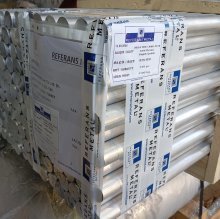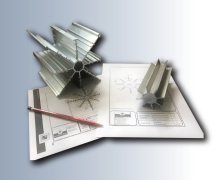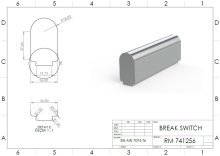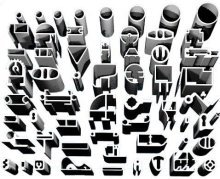



板/板
钣金
棒条/金属板
管道/型材
7020
ASTM B209 / AlZn4,5Mg1 / 7020 / T7351
| 化学性质 | % 值 |
| Chromium (Cr) | 0,10 - 0,35 |
| Manganese (Mn) | 0,05 - 0,50 |
| Magnesium (Mg) | 1,00 - 1,40 |
| Copper (Cu) | 0,00 - 0,20 |
| Titanium (Ti) | 0,00 - 0,17 |
| Iron (Fe) | 0,00 - 0,40 |
| Zinc (Zn) | 4,00 - 5,00 |
| Aluminium (Al) | Balance |
| Titanium + Zirconium (Ti+Zr) | 0,08 - 0,20 |
| 物理特性 | 值 |
| Density | 2.78 g/cm³ |
| Melting Point | 605 °C |
| Thermal Expansion | 23,3 µm/m.°C |
| Modulus of Elasticity | 71 GPa |
| Thermal Conductivity | 151 W/m-K |
| Electrical Resistivity | %38 IACS |
| 机械性能 | 值 |
| Proof Strength | 300 MPa |
| Yield Strength | 390 MPa |
| Shear Strength | 230 MPa |
| Elongation A50 mm | %12 |
| Hardness | 100 HB |
The 7020 T7351 aluminum alloy is known for its high strength, durability, and excellent mechanical properties. As part of the aluminum-zinc alloy family, it is primarily used in aerospace, space, and high-performance structural applications. The T7351 temper, achieved through specific heat treatments, provides the alloy with high durability, stress resistance, and hardness while maintaining machinability. Its high strength-to-weight ratio makes the 7020 T7351 alloy ideal for heavy-load-bearing applications that require high durability.
The 7020 T7351 aluminum alloy has limited suitability for anodizing. Its high zinc content prevents the formation of an effective oxide layer during anodizing, making it difficult to protect the alloy through this process. Therefore, other coating methods are generally used for protection. In terms of weldability, the 7020 T7351 alloy requires careful handling during welding. The high zinc content increases the risk of cracking, so special welding techniques and appropriate filler materials are needed to minimize this risk.
In terms of bending and forming, the 7020 T7351 aluminum alloy can present challenges due to its high strength. However, with the correct processing techniques, successful bending and forming can be achieved. Additionally, the 7020 T7351 alloy is suitable for use in high-vibration environments. Its high elastic modulus and durability make it ideal for vibration-resistant components such as engine parts, chassis, and other components exposed to vibrations.
Regarding corrosion resistance, the 7020 T7351 aluminum alloy may have limited resistance due to its high zinc content compared to other aluminum alloys. However, its corrosion resistance can be improved with proper surface coatings and treatments. The advantages of the 7020 T7351 alloy include high strength, durability, and lightweight properties, while its disadvantages include limited corrosion resistance and welding challenges.
Choosing Factors for 7020 T7351
- Strength: Very good
- Machining: Good
- Weldability: Good
- Formability: Fair
- Corrosion Resistance: Satisfactory
- Heat Treating: Yes
Some Well-Known Applications for 7020 T7351
Mainly in the aerospace industry,
In motorcycle and bicycle parts,
It is also used in parts exposed to high loads.
- Plate

 计算 重量计算
计算 重量计算
